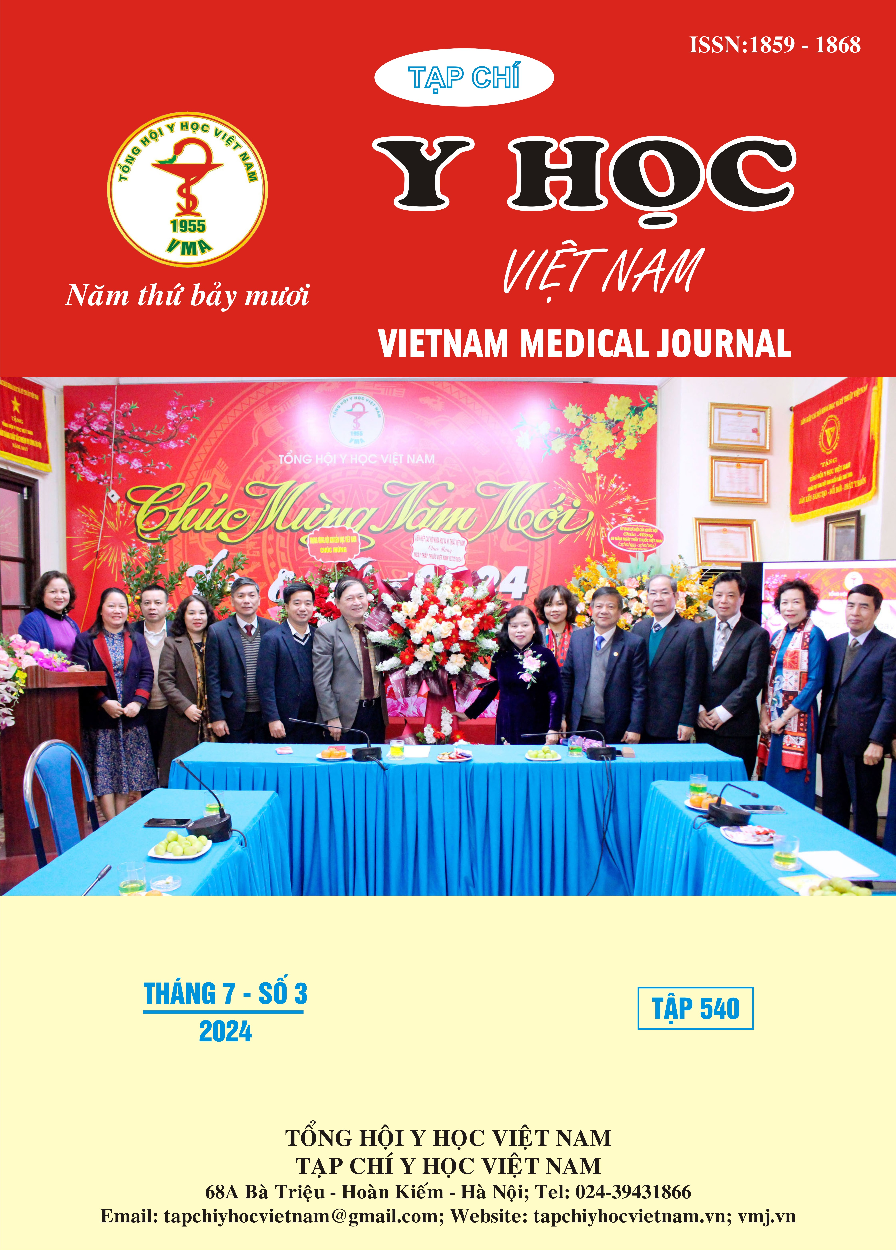EVALUATION OF TNF-ΑLPHA SECRETION CAPACITY OF CAR-T CELLS IN COMBINATION WITH ANTI-PD-1 ANTIBODIES IN VITRO
Main Article Content
Abstract
Objective: To evaluate the TNF-α secretion capacity of CAR-T cells in combination with anti-PD-1 antibodies. Materials and methods: We performed a prospective experimental study on 3 cell lines, including 2 CD19(+) leukemia cell lines (Daudi and Raji) and 1 CD19(-) cell line (K562). All 3 cell lines were co-cultured with 4 groups of PBMC (Peripheral Blood Mononuclear Cell), anti-PD-1 antibody (PD-1 Ab), CAR-T cells only, and CAR-T cells in combination with anti-PD-1 antibodies. The TNF-α secretion capacity at 24 and 48 hours after co-culture was determined using the TNF-α Human ELISA Kit from Thermo Fisher Scientific. Results: At both 24 and 48 hours, TNF-α concentrations in the group of CAR-T cells only and CAR-T cells in combination with anti-PD-1 antibodies when co-cultured with CD19(+) leukemia cell lines (Daudi and Raji) were significantly higher than in the PBMC cells (control group) co-cultured with CD19(+) leukemia cell lines and the CD19(-) cell line. However, there was no difference in TNF-α concentrations between the CAR-T cell only and CAR-T cells in combination with anti-PD-1 antibodies (p > 0.05). Conclusion: TNF-α concentrations increased in culture media of CAR-T cells and CAR-T combined with PD-1 Ab when co-cultured with cancer cells. Especially when cultured with CD19(+) cells, TNF-α concentrations increased higher than when cultured with CD19(-) cells.
Article Details
Keywords
CAR-T, PD-1 Ab, TNF-α
References
2. Dai H., Wang Y., Lu X., et al. (2016). Chimeric Antigen Receptors Modified T-Cells for Cancer Therapy. J Natl Cancer Inst, 108(7).
3. Han Y., Liu D., Li L. (2020). PD-1/PD-L1 pathway: current researches in cancer. Am J Cancer Res, 10(3): 727-742.
4. Wang Z., Li N., Feng K., et al. (2021). Phase I study of CAR-T cells with PD-1 and TCR disruption in mesothelin-positive solid tumors. Cell Mol Immunol, 18(9): 2188-2198.
5. Zhou Y., Mu W., Wang C., et al. (2023). Ray of dawn: Anti-PD-1 immunotherapy enhances the chimeric antigen receptor T-cell therapy in Lymphoma patients. BMC Cancer, 23(1): 1019.
6. Boulch M., Cazaux M., Loe-Mie Y., et al. (2021). A cross-talk between CAR T cell subsets and the tumor microenvironment is essential for sustained cytotoxic activity. Sci Immunol, 6(57).
7. Xiao Xinyi, Huang Shengkang, Chen Sifei, et al. (2021). Mechanisms of cytokine release syndrome and neurotoxicity of CAR T-cell therapy and associated prevention and management strategies. Journal of Experimental & Clinical Cancer Research, 40(1): 367.
8. Fischer J. W., Bhattarai N. (2021). CAR-T Cell Therapy: Mechanism, Management, and Mitigation of Inflammatory Toxicities. Front Immunol, 12: 693016.
9. Meiraz A., Garber O. G., Harari S., et al. (2009). Switch from perforin-expressing to perforin-deficient CD8(+) T cells accounts for two distinct types of effector cytotoxic T lymphocytes in vivo. Immunology, 128(1): 69-82.
10. Chen Y., Li R., Shang S., et al. (2021). Therapeutic Potential of TNFα and IL1β Blockade for CRS/ICANS in CAR-T Therapy via Ameliorating Endothelial Activation. Front Immunol, 12: 623610.


